Filing and paying taxes is vital for every business owner. Yet, many make tax errors without realizing it. These errors can cause big IRS fines and audits. To keep your business safe and tax-compliant, it’s crucial to know and dodge these errors.
Many mistakes, like underpaying taxes or poor record-keeping, can lead to serious issues. Are you familiar with common tax errors? And do you know how to avoid big fines and audits?
In this article, we’re going to look at major business tax errors to avoid. This will help you stay in the good books of the IRS. Together, we’ll discover how to keep your taxes in check.

Key Takeaways:
- Underpaying estimated taxes can result in penalties and should be calculated carefully.
- Depositing employment taxes correctly and on time is crucial to avoid penalties from the IRS.
- Timely filing of business tax returns is essential to avoid late filing penalties.
- Separating business and personal expenses is vital to accurately claim tax deductions.
- Maintaining accurate financial records helps streamline tax preparation and demonstrate financial transparency.
Underpaying Estimated Taxes
For business owners, correctly estimating and paying taxes is crucial. Not doing so can lead to IRS penalties. Understanding estimated taxes and making accurate payments is essential.
Estimated taxes are for those who expect to owe $1,000 or more by year-end. These are paid quarterly to cover income and self-employment taxes. Freelancers and self-employed people must make these payments.
When you underpay estimated taxes, the IRS can impose a penalty. This penalty depends on how much less you paid compared to your actual tax liability. Avoiding this penalty by paying the right amount is key.
Getting your estimated taxes right can be tricky. This is especially true for businesses with ups and downs in income or those facing major changes. Consulting a tax professional or using tax software can help ensure accuracy.
By paying the right amount on time, businesses can dodge penalties. It’s important to stay on top of tax laws and manage finances smoothly. Planning ahead and monitoring income will help avoid any issues with the IRS.
Depositing Employment Taxes
Having employees means you need to understand employment taxes well. These taxes include what you withhold from wages and your employer contributions.
It’s vital to deposit these taxes on time to meet IRS rules and dodge penalties.
If you don’t deposit employment taxes properly, the IRS may penalize you. These fines can greatly hurt your business’s finances. So, it’s key to deposit these taxes right and on time.
You help your business stay in good standing and succeed by keeping up with these taxes.
Understanding Employment Taxes
Employment taxes have several parts, like federal income tax withholding, Social Security and Medicare (FICA), and federal unemployment tax (FUTA).
Let’s get into what each part means:
| Employment Tax Component | Description |
|---|---|
| Federal Income Tax Withholding | This is the money taken from paychecks for federal taxes. |
| Social Security and Medicare Taxes (FICA) | These are the taxes for Social Security and Medicare. Both you and your employees pay. |
| Federal Unemployment Tax (FUTA) | This is the tax you pay to help workers who’ve lost their jobs. |
Knowing these parts helps you make sure you’re paying these taxes right and on time.
Penalty for Late Deposits
If you’re late depositing employment taxes, the IRS might fine you. These penalties help ensure all businesses meet their tax duties.
The exact fine depends on how much and how late. Often, the fine is a percent of the owed tax, which can accumulate.
To dodge fines, be organized, keep clean records, and know when taxes are due. This helps you stay in line and keep away from extra costs from fines.
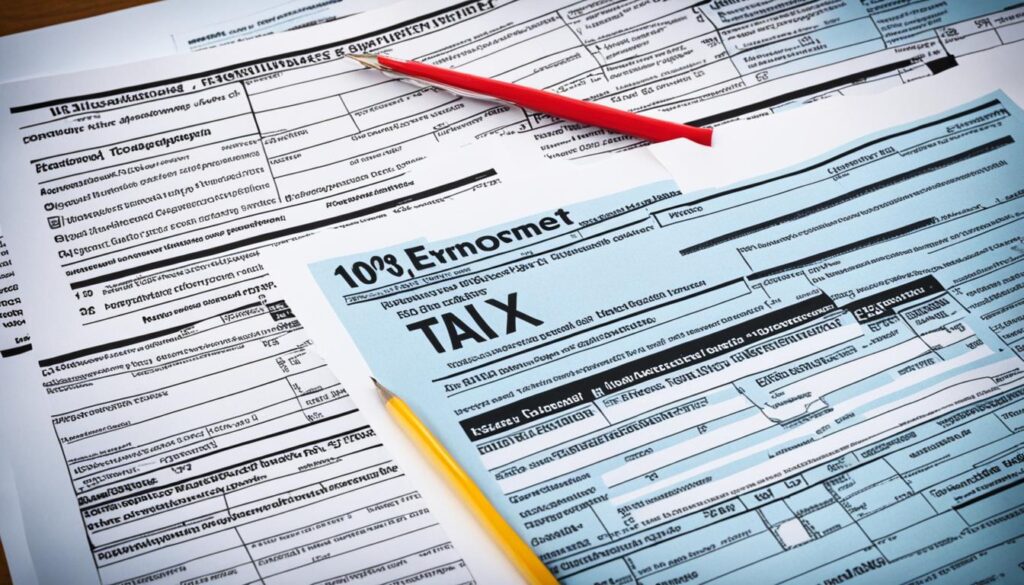
Now that you know the risks of being late on taxes, let’s look at how to stay compliant. The next parts of this article will give you tips and advice to manage your business taxes well.
Filing Late
Just like individual returns, business tax returns need to be filed on time. If you miss the deadline, you might face late filing penalties. It’s key for business owners to know their deadlines and stick to them to dodge penalties.
The deadlines for filing vary by the business type and structure. Knowing your specific deadline is critical to file on time and avoid fines. Whether running a sole proprietorship, partnership, or corporation, it’s vital to meet the IRS deadline.
If you don’t file by the due date, you’ll get hit with late filing penalties. These fines are different from those for unpaid taxes. The IRS uses these penalties to motivate timely and accurate filing.
Businesses filing late can face stiff penalties. The IRS calculates these based on how much tax you owe, up to a max percentage. Plus, interest on the unpaid tax keeps growing, adding to the business’s financial strain.
Consequences of Late Filing
Being late on filing can really hurt your business financially. Here’s what you might face:
- **Late Filing Penalties**: These penalties can range from 5% to 25% of the tax due. The longer you wait, the more you pay.
- **Interest Charges**: On top of penalties, the IRS charges interest from the due date until you pay. This interest can grow over time.
- **Audit Risk**: Late filings can make the IRS suspicious. They might think you’re avoiding taxes or have bad record-keeping.
- **Cash Flow Issues**: Delays can mess up your business’s cash flow. It might even affect getting loans since lenders often want recent tax returns.
Meeting Business Tax Return Deadlines
To steer clear of penalties and other troubles, it’s crucial to meet deadlines. Here’s how to stay on track:
- **Know Your Filing Deadlines**: Learn about your deadlines based on your business’s structure. The IRS has resources to help you track these dates.
- **Organize Your Records**: Keep your financial records up to date. This helps the tax prep process and ensures you won’t be late.
- **Consider Seeking Professional Help**: If you find tax filing challenging or complex, get help from a professional. This way, you’ll file accurately and on time.
- **Set Reminders and Create a Filing Schedule**: Use digital tools for reminders. Plan your filing process in advance to have everything ready by the deadline.

Not Separating Business and Personal Expenses
Many business owners make the mistake of not separating their business and personal expenses. This mix-up can cause confusion and mistakes during tax time. It is vital to keep these expenses apart to track and claim deductions accurately.
Separating your expenses means you can rightfully claim only business expenses on taxes. This also helps during IRS audits, as it provides clear proof of your business deductions.
There are steps to help separate your expenses:
- Open a separate bank account for your business: This makes tracking business transactions simpler.
- Use separate credit cards: A distinct credit card for business expenses keeps them apart from personal ones.
- Maintain separate financial records: Keep detailed records of business transactions, like invoices and receipts, apart from personal ones.
- Properly track mileage: If you use a vehicle for both personal and business use, accurately record the business-related mileage.
Keeping business and personal expenses separate is key for tax regulation compliance and understanding your business’s financial state. With correct records and legitimate tax deductions, you can improve your tax strategy and lower your taxable income.
Benefits of Separating Business and Personal Expenses
There are several benefits to separating your expenses:
- Accurate tax deductions: Clear separation makes it easier to spot and claim eligible business expenses for deductions.
- IRS compliance: Keeping distinct records helps you stay in line with IRS rules and lowers audit risks.
- Better financial management: Separation allows for better tracking of business expenses and financial decision-making.
- Increased transparency: Separate records show transparency, building trust with investors and partners.
It’s crucial to clearly separate business and personal expenses. Doing this helps with your tax deductions, ensures IRS compliance, and maintains your financial records’ integrity.

| Business Expenses | Personal Expenses |
|---|---|
| Office rent | Home mortgage |
| Business insurance | Auto insurance |
| Business travel expenses | Personal vacation expenses |
| Employee salaries | Family member’s salaries |
As shown in the table above, separating expenses helps tell apart deductible business costs from non-deductible personal costs. This not only aids in taxes but also ensures precise financial reporting and compliance.
Neglecting Record-Keeping Practices
Many businesses make the mistake of ignoring their record-keeping. Keeping up with financial records is key. It helps follow tax laws, shows your numbers clearly, and makes tax time easier.
Not keeping good records can create tax problems. Bad records lead to reporting mistakes and may cause audits or fines. So, it’s crucial.
Good record-keeping makes tax prep and managing finances smoother. Accounting software is a great tool for this. It tracks money coming in and going out and helps keep everything in order.
It’s also important to keep documents like receipts and bank statements. These support your tax return info. They help prove your financials are right and can protect you during audits.
“Record keeping is the backbone of every successful business. It provides the financial transparency needed to make informed decisions and ensures compliance with tax regulations.”
-John Smith, CPA
Benefits of Effective Record-Keeping
Good record-keeping is not just for tax time. It has many other benefits:
- Financial Transparency: It lets you see clearly how your business is doing money-wise. This makes it easier to check if you’re making profit, keep an eye on spending, and watch your cash flow.
- Better Decision Making: With clear records, you can make smart choices based on true financial data.
- Easier Audit Defense: Neat records reduce stress if the IRS checks on you. You can quickly show the needed docs.
- Business Growth: Keeping track helps you plan financially. This can lead to finding ways to grow, getting loans, and attracting investors.
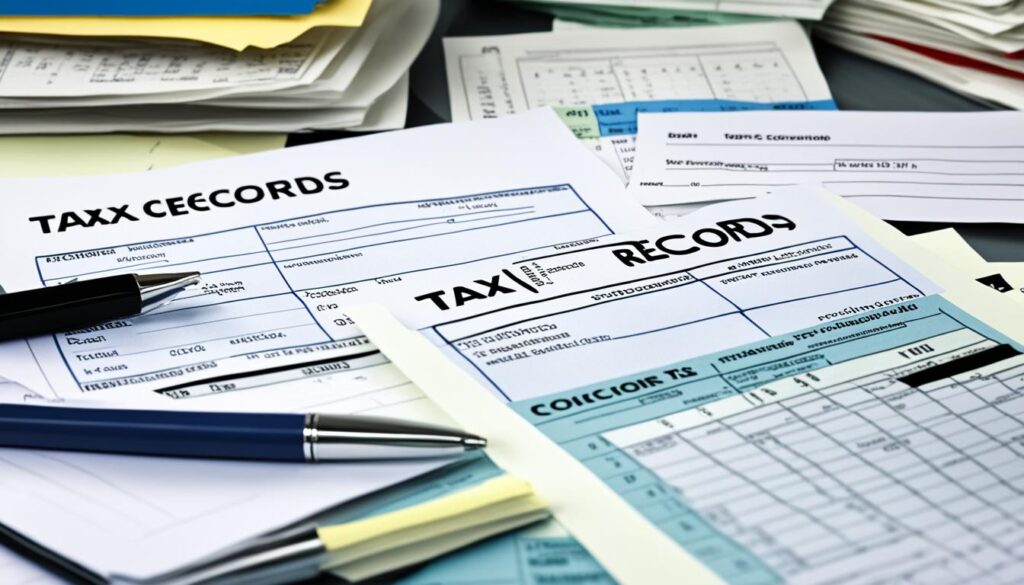
| Record-Keeping Tips | Explanation |
|---|---|
| Use Accounting Software | Accounting software makes keeping records easier. It automates the work, tracks money, and creates financial reports. |
| Maintain Organized Files | Keep all important paper and digital documents safe. This includes receipts, invoices, and bank information. |
| Separate Business and Personal Finances | Using different accounts for business and personal use keeps records clear. It makes tax time less confusing. |
| Regularly Reconcile Accounts | Matching your records with bank statements checks that all transactions are correctly noted. |
| Backup and Secure Records | Backing up digital records keeps them safe. Make sure they’re secure against loss or theft. |
Misclassifying Workers
When businesses misclassify workers, they face tax and legal issues. This happens when they label workers wrongly as either employees or independent contractors. Knowing IRS guidelines helps avoid these problems.
The IRS has clear rules for worker classification. These rules look at how much control a business has over a worker, the relationship, and the work type. Business owners must review these guidelines to classify workers correctly.
A worker tagged as an independent contractor wrongly can lead to employer tax issues. Employers must withhold payroll taxes for employees, not contractors. Misclassification can dodge these taxes, hurt workers, and lead to IRS fines.
Also, calling an employee an independent contractor brings legal troubles. Contractors don’t get the same rights or benefits as employees. If a misclassified worker complains or sues for employee status, employers may have to pay fines and back-pay.
Correct classification is key for tax and legal safety. Consulting a tax expert or lawyer is wise to avoid misclassification risks.
Consequences of Misclassification
Misclassifying workers can lead to several problems, such as:
- IRS Penalties: Employers can get fined for not handling payroll taxes right if the IRS finds misclassification.
- Back Taxes and Payments: Employers might need to pay back taxes and contributions for misclassified workers.
- Legal Liability: Workers labeled as contractors can seek employee rights through complaints or lawsuits, causing legal and financial issues for employers.
- Loss of Tax Deductions: Losing certain tax deductions and benefits increases the employer’s tax bill.
It’s vital to classify workers properly to dodge these issues. Sticking to IRS rules, getting professional advice, and evaluating work relationships closely can help businesses avoid misclassification dangers.
| Incorrect Classification | Consequences for Employers | Consequences for Workers |
|---|---|---|
| Employee misclassified as an independent contractor | Potential IRS penalties Back-tax obligations Legal liabilities |
Lack of employee benefits No protection under labor laws |
| Independent contractor misclassified as an employee | Potential IRS penalties Payroll tax obligations Legal liabilities |
Entitled to employee rights and protections |

Overlooking Deductible Expenses
As a small business owner, keeping track of deductible expenses is key. This can help you make the most of tax deductions and lower your taxable income. Many miss out on these savings because they’re not aware or they forget.
Claiming all eligible expenses can greatly reduce your tax bill. This means you could save a lot of money. That extra cash can boost your business’s financial health.
What are deductible expenses, you ask? They are costs from running your business that you can deduct from your taxable income. This means you pay less tax.
There are many kinds of deductible expenses, for example:
- Office supplies and equipment
- Business travel and transportation
- Advertising and marketing expenses
- Professional fees (e.g., attorney or accountant fees)
- Insurance premiums
- Business-related subscriptions and memberships
These expenses can reduce your gross income. Thus, your taxable income lowers and you may face a smaller tax bill.
It’s vital to keep track of all business expenses to avoid missing out. Talking to a tax expert can help you understand what you can deduct.
Good record-keeping and sorting your expenses is crucial. This way, when the IRS checks, you are prepared. Being organized and alert helps you make the most of tax benefits for small businesses.

Takeaway:
Don’t lose valuable tax deductions. Always keep accurate records, seek advice from a tax pro, and stay alert for deductible expenses. This can greatly help in saving on taxes.
Ignoring Estimated Tax Payments
Many business owners, like freelancers, might forget to handle their estimated tax payments. These are quarterly payments made to the IRS. They help avoid penalties for paying too little.
To avoid issues, business owners who owe $1,000 or more need to calculate their taxes. Then, they divide this amount into four payments throughout the year. This helps manage tax responsibilities and avoid a big bill at year’s end.
Underpayment penalties can increase your tax bill with added interest. It’s vital for business owners to remember these quarterly payments. Doing so keeps you in good standing with the IRS.
Freelancers and self-employed individuals often face unpredictable incomes, making tax estimation hard. They might benefit from consulting a tax expert. This can help ensure they’re paying the right amount.
“Remember, estimated tax payments are not an optional task but a legal obligation. By fulfilling your estimated tax obligations, you avoid unnecessary penalties and stay on top of your tax responsibilities.”
Estimated Tax Payment Schedule
The IRS sets quarterly deadlines for these payments:
| Quarter | Due Date |
|---|---|
| 1st Quarter | April 15 |
| 2nd Quarter | June 15 |
| 3rd Quarter | September 15 |
| 4th Quarter | January 15 (following year) |
Note: these dates might change if they land on a weekend or holiday. Missing these dates can lead to penalties. It means more taxes when you file your return.
Calculating Estimated Tax Payments
To calculate payments, business owners can use the annualized income method or the prior-year method. The annualized method offers precise estimations. The prior-year method works best for those with steady income.
With the annualized income method, estimate your income and deductions each quarter. This method accounts for changes in income throughout the year.
The prior-year method is based on last year’s income and deductions. It’s good for businesses with stable finances. Whatever method you choose, accurate calculations are key. This prevents penalties and ensures you comply with tax laws.
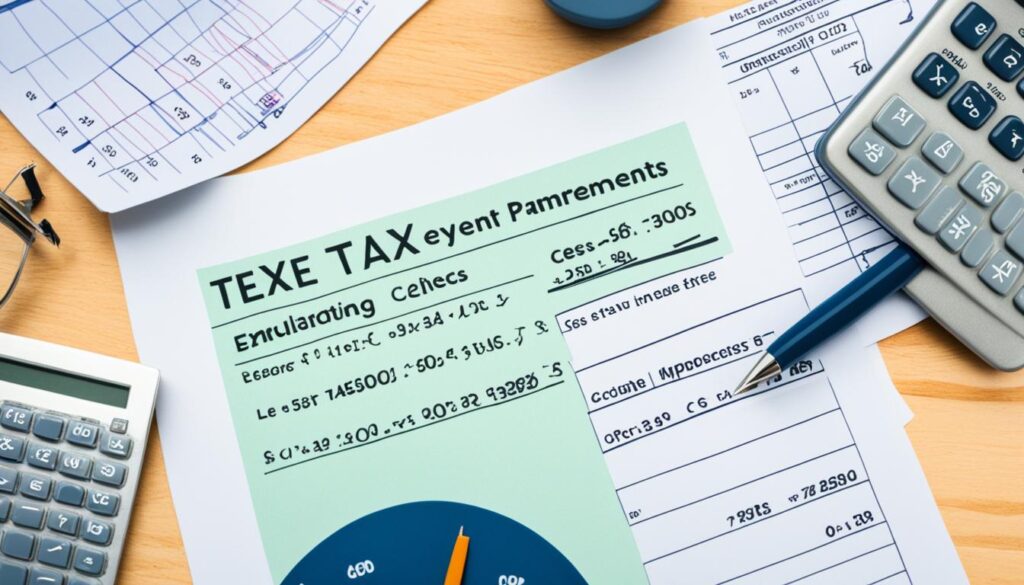
Mishandling Payroll Taxes
Payroll taxes are key to running a business. Not handling them right can cause big problems. This includes fines and extra charges that hit your wallet hard. It’s very important for bosses to look after payroll taxes well to avoid issues.
There are two ways businesses can handle payroll taxes well. They can either use good payroll software or get help from pros. Each option has its plus points. They make handling payroll taxes easier and keep you in line with the law.
Good payroll software makes hard math easy and keeps tax info right. It helps you avoid mistakes and fines. The software also creates reports and keeps track of everything. This is very handy when it’s time to report taxes or if someone checks your records.
Getting help from pros can also ease your mind. Payroll experts know the ins and outs of payroll taxes. They keep up with tax rules and make sure your business follows them. Also, letting pros handle payroll lets bosses focus on other important work.
Knowing how to manage payroll taxes is crucial, no matter which way you go. This means knowing who works for you, keeping track of hours, and taking out the right amount of taxes. Not doing this can lead to big fines and legal trouble. By using good software or hiring pros, you can stay away from these problems. This ensures everything runs smoothly.
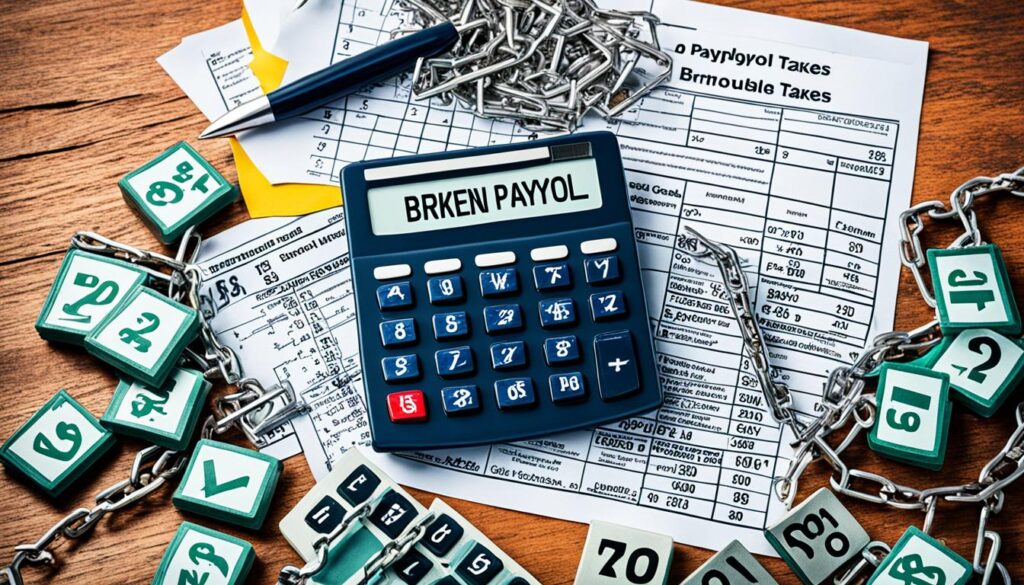
Key Takeaways:
- Mishandling payroll taxes can lead to penalties and interest charges.
- Investing in reliable payroll software can simplify tax calculations and ensure timely payments.
- Outsourcing payroll responsibilities to professionals can provide expertise and compliance assurance.
- Proper employee classification, accurate record-keeping, and tax withholding are essential for payroll tax management.
Forgetting Quarterly Filings and Deadlines
Quarterly tax filings are key for businesses to comply with tax laws. Not meeting these deadlines can lead to penalties. It’s vital for business owners to keep track of when tax returns need to be filed.
If you miss these deadlines, the IRS may impose fines. These fines depend on how much tax you owe and how late you are. To avoid fines, make sure to file on time and with accurate tax returns.
“Late filing penalties can quickly affect your business’s finances. Make quarterly tax filings a priority and dedicate time and resources to follow compliance,” advises Jane Adams, a tax consultant.
Setting up reminders or using tax software helps avoid forgetting to file quarterly. This way, businesses can be ready with all needed information and documents.
Penalties for Late Filing
The IRS calculates late filing penalties by how much tax is owed and the delay’s length. They charge a certain percentage more for each month you’re late.
Late filing can also hurt your business’s cash flow. It can delay tax refunds, affecting your ability to pay bills or invest.
To stay financially stable, filing taxes on time is a must. This ensures you follow tax rules and avoid risks.
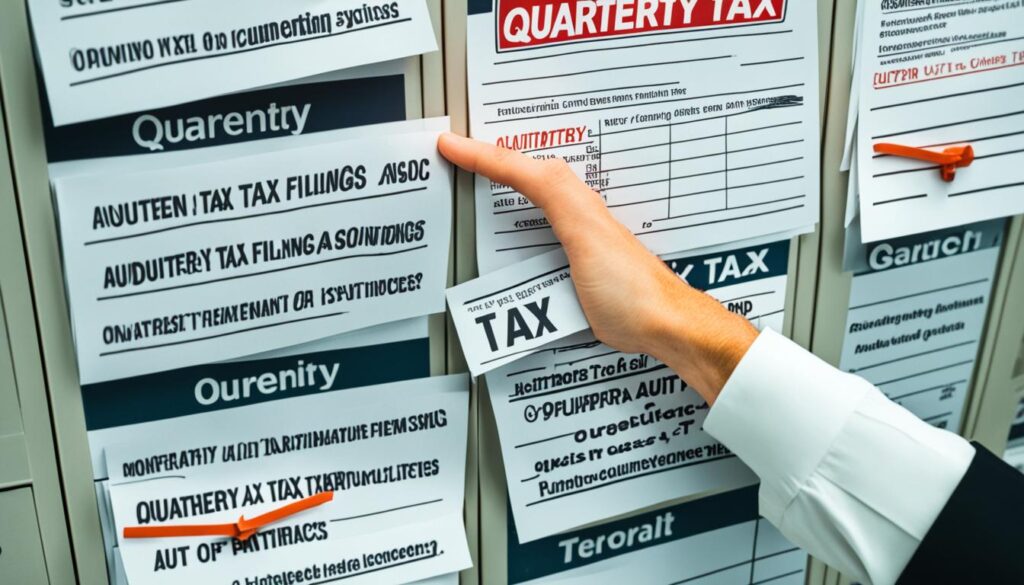
| Penalty Percentage | Duration of Delay |
|---|---|
| 2% | 1-5 months |
| 5% | 6-12 months |
| 10% | More than 12 months |
Table: Penalties for late filing of quarterly tax returns
Disregarding State and Local Tax Requirements
Running a small business means dealing with more than just federal taxes. You have to know the state and local taxes too. In each place, these taxes can be very different. Not following the specific tax laws can lead to big problems and fines.
Every state and city has its own tax rules. You might face sales tax, income tax, property tax, and others based on what your business does. To avoid trouble, it’s vital to research your state and local tax duties. Seeking help from a tax professional could also be a wise choice.
Ignoring these taxes can lead to audits, penalties, and legal issues. Such mistakes cause financial and reputation harm that could have been dodged. Understanding and meeting your tax responsibilities is key. It not only keeps you in compliance but also lets your business run well everywhere.
FAQ
What are some common business tax mistakes to avoid?
What happens if I underpay my estimated taxes?
FAQ
What are some common business tax mistakes to avoid?
Key mistakes include underpaying taxes and not filing on time. Mixing your business and personal expenses is another error. Forgetting to keep records or incorrectly listing workers are common too. Don’t overlook deductible expenses or estimated tax payments. Avoid errors with payroll taxes and always remember the quarterly deadlines. Lastly, don’t ignore state and local tax laws.
What happens if I underpay my estimated taxes?
Underpaying can lead to penalties. If you owe
FAQ
What are some common business tax mistakes to avoid?
Key mistakes include underpaying taxes and not filing on time. Mixing your business and personal expenses is another error. Forgetting to keep records or incorrectly listing workers are common too. Don’t overlook deductible expenses or estimated tax payments. Avoid errors with payroll taxes and always remember the quarterly deadlines. Lastly, don’t ignore state and local tax laws.
What happens if I underpay my estimated taxes?
Underpaying can lead to penalties. If you owe $1,000 or more, you must pay estimated taxes to avoid these penalties.
What are the penalties for late employment tax deposits?
Late deposits can trigger IRS penalties. Understanding and meeting employment tax deadlines is crucial to avoid these problems.
What are the penalties for filing business tax returns late?
Late filings result in penalties. Knowing and following the deadlines helps to avoid these fines.
Why is it important to separate business and personal expenses?
Blending expenses creates confusion, making tax deductions difficult. To accurately claim deductions and avoid IRS issues, keep these expenses separate.
How can accurate record-keeping help with tax preparation?
Good records reduce filing mistakes. Use software and keep documents to streamline taxes, minimize errors, and show your finances clearly.
What are the consequences of misclassifying workers?
Wrong classification can result in fines and legal trouble. Follow IRS rules to classify workers correctly and avoid these penalties.
How can business owners maximize tax deductions?
Many small businesses miss key deductions. Identifying and claiming all eligible expenses can lower taxable income and increase deductions.
What are the penalties for not making timely estimated tax payments?
Late or missed payments lead to underpayment penalties. Calculate and remit quarterly taxes on time to meet tax obligations and dodge fines.
What are the consequences of inaccurate payroll tax calculation or late payment?
Inaccuracies or delays in payroll taxes attract penalties and interest. Utilizing payroll software or outsourcing ensures accuracy and timeliness.
What are the penalties for missing quarterly tax filing deadlines?
Missing deadlines results in penalties and cash flow issues. Remain organized and submit filings on time to maintain compliance and avoid fines.
Why is it important to fulfill state and local tax requirements?
Compliance with local and state taxes is key for smooth operations. Business owners must understand and meet all relevant tax obligations.
,000 or more, you must pay estimated taxes to avoid these penalties.
What are the penalties for late employment tax deposits?
Late deposits can trigger IRS penalties. Understanding and meeting employment tax deadlines is crucial to avoid these problems.
What are the penalties for filing business tax returns late?
Late filings result in penalties. Knowing and following the deadlines helps to avoid these fines.
Why is it important to separate business and personal expenses?
Blending expenses creates confusion, making tax deductions difficult. To accurately claim deductions and avoid IRS issues, keep these expenses separate.
How can accurate record-keeping help with tax preparation?
Good records reduce filing mistakes. Use software and keep documents to streamline taxes, minimize errors, and show your finances clearly.
What are the consequences of misclassifying workers?
Wrong classification can result in fines and legal trouble. Follow IRS rules to classify workers correctly and avoid these penalties.
How can business owners maximize tax deductions?
Many small businesses miss key deductions. Identifying and claiming all eligible expenses can lower taxable income and increase deductions.
What are the penalties for not making timely estimated tax payments?
Late or missed payments lead to underpayment penalties. Calculate and remit quarterly taxes on time to meet tax obligations and dodge fines.
What are the consequences of inaccurate payroll tax calculation or late payment?
Inaccuracies or delays in payroll taxes attract penalties and interest. Utilizing payroll software or outsourcing ensures accuracy and timeliness.
What are the penalties for missing quarterly tax filing deadlines?
Missing deadlines results in penalties and cash flow issues. Remain organized and submit filings on time to maintain compliance and avoid fines.
Why is it important to fulfill state and local tax requirements?
Compliance with local and state taxes is key for smooth operations. Business owners must understand and meet all relevant tax obligations.